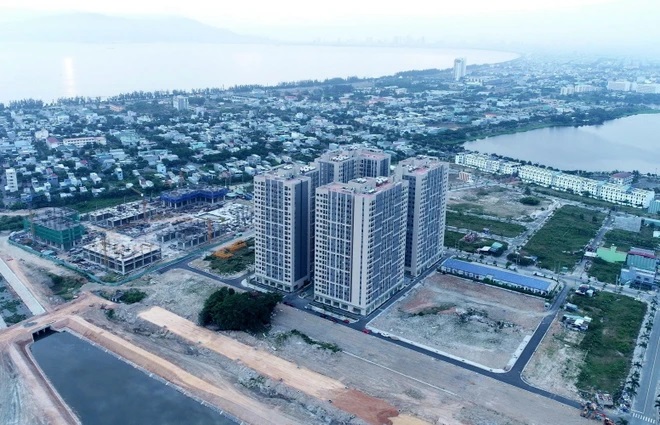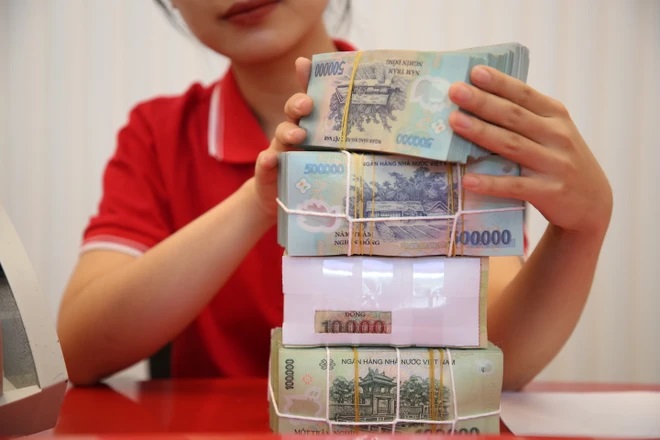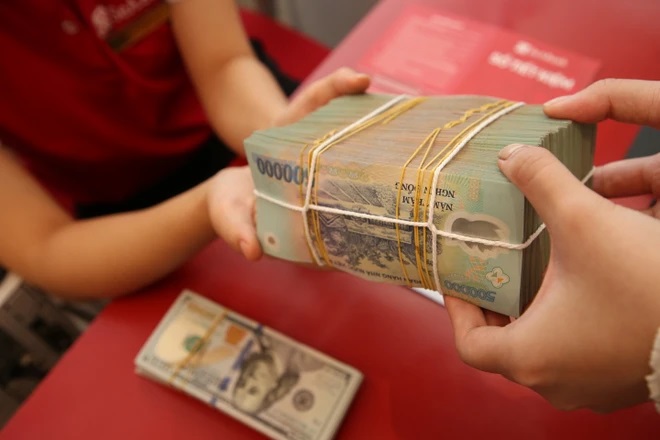 |
Ho Chi Minh City’s real estate in the East is located in Thu Thiem urban area, Thu Duc city, Ho Chi Minh City. (Photo: Hong Dat/VNA)
|
A series of economic policies, including the Land Law, the Housing Law, the Real Estate Business Law, and several circulars from ministries and sectors, will officially take effect in August 2024.
The Land Law, Housing Law, and Real Estate Business Law will take effect on August 1, 2024
On June 29, 2024, the National Assembly passed Law No. 31/2024/QH15, amending and supplementing a number of articles of the Land Law, the Housing Law No. 27/2023/QH15, the Real Estate Business Law No. 29/2023/QH15, and the Law on Credit Institutions No. 32/2024/QH15.
Consisting of five articles and taking effect on August 1, 2024, the Law amends and supplements a number of articles of the Land Law No. 31/2024/QH15 as follows: “Resolution No. 132/2020/QH14 dated November 17, 2020, of the National Assembly on piloting some policies to remove difficulties and obstacles in the management and use of defense and security land, combined with labor production, and economic construction, will be abolished from January 1, 2025.”
It also amends and supplements Clause 1, Article 252, stating that “This Law takes effect on August 1, 2024, except for cases prescribed in Clauses 2 and 3 of this Article.”
In addition, it amends and supplements Clause 10, Article 255, regarding investment projects that are exempt from land auctions. These projects must meet one of the following conditions:
a) Projects that have selected investors and project owners in accordance with the Law on Investment, the Housing Law, and the Bidding Law from July 1, 2014, to July 31, 2024;
b) Projects for which investors have submitted valid dossiers for the selection of investors and project owners before August 1, 2024, and have selected investors and project owners before January 1, 2025.
The selection of investors and project owners for projects specified in this Clause must comply with the provisions of the Law on Investment, the Housing Law, and the Bidding Law in effect at the time of dossier submission.
At the same time, the Law also amends and supplements Clause 1, Article 197 of the Housing Law No. 27/2023/QH15; Clause 1, Article 82 of the Real Estate Business Law No. 29/2023/QH15; and Clause 2, Article 209 of the Law on Credit Institutions No. 32/2024/QH15, which will take effect on August 1, 2024.
New regulations on compensation, support, and resettlement when the State recovers land
The Government has issued Decree No. 88/2024/ND-CP dated July 13, 2024, on compensation, support, and resettlement when the State recovers land.
Decree No. 88/2024/ND-CP stipulates compensation in the form of land with a different purpose from the type of land recovered or in the form of housing when the State recovers land as prescribed in Clause 1, Article 96, Clause 1, Article 98, and Clause 1, Article 99 of the Land Law.
According to the Decree, the land price for calculating the land use levy when compensating with land of a different purpose from the type of land recovered for households and individuals, overseas Vietnamese with land use rights or ownership of houses attached to land use rights in Vietnam, is the land price determined by the land price frame at the time of approval of the compensation, support, and resettlement plan.
 |
Illustration. (Source: VNA)
|
In the case of compensation in the form of land lease with a one-time land rent payment for the entire lease period, the land price for calculating the land rent shall be the specific land price decided by the People’s Committee of the same level as the competent state agency at the time of approval of the compensation, support, and resettlement plan.
The land price for calculating the land use levy or land rent when compensating with land of a different purpose from the type of land recovered for economic organizations with recovered residential land is the specific land price decided by the People’s Committee of the same level as the competent state agency at the time of approval of the compensation, support, and resettlement plan.
In cases where there is a difference between the compensation, support, and resettlement amount and the land use levy or land rent amount that must be paid when allocated or leased other land or when buying a house, the following regulations shall apply:
If the compensation, support, and resettlement amount is higher than the land use levy or land rent amount to be paid when allocated or leased other land of a different purpose from the type of land recovered or when buying a house, the person whose land is recovered shall receive the difference;
If the compensation, support, and resettlement amount is lower than the land use levy or land rent amount to be paid when allocated or leased other land of a different purpose from the type of land recovered or when buying a house, the person whose land is recovered must pay the difference.
The People’s Committee at the provincial level shall, based on the land fund, housing fund, and actual situation in the locality, stipulate the conversion rate and conditions for compensation in the form of land of a different purpose from the type of land recovered or in the form of housing for the person whose land is recovered.
This Decree takes effect on August 1, 2024.
Standards for Real Estate Appraisal
The Ministry of Finance has issued Circular No. 42/2024/TT-BTC dated June 20, 2024, promulgating the Vietnamese Valuation Standards on Real Estate Appraisal.
According to the Circular, these standards and guidelines apply to real estate appraisal when conducting valuations in accordance with the Law on Price and its guiding documents. They do not apply to land price determination according to the Law on Land.
The approaches used in real estate appraisal include the market approach, the cost approach, and the income approach as prescribed in the Vietnamese Valuation Standards or a combination of these approaches.
The valuation methods used in real estate appraisal include methods belonging to the above-mentioned approaches or a combination of them. The surplus method is a valuation method based on a combination of the market approach, the cost approach, and the income approach.
 |
Apartment buildings on Nguyen Huu Canh Street, Binh Thanh District, Ho Chi Minh City. (Photo: Hong Dat/VNA)
|
Depending on the characteristics of the real estate to be appraised, the purpose of the appraisal, the appraisal date, the basis of the appraised value, and the information and data that can be collected about the real estate to be appraised, the appropriate approach and method shall be selected.
This Circular takes effect on August 5, 2024.
Amendments to regulations on indirect overseas investment
On June 28, 2024, the State Bank of Vietnam issued Circular No. 23/2024/TT-NHNN amending and supplementing a number of articles of Circular No. 10/2016/TT-NHNN dated June 29, 2016, guiding the implementation of a number of articles of Decree No. 135/2015/ND-CP dated December 31, 2015, of the Government on indirect investment abroad.
Circular 23/2024/TT-NHNN amends and supplements Article 8 on the principles of implementing the overseas stock reward program. Accordingly, the implementation of the overseas stock reward program must ensure the following principles:
The overseas stock reward program with participants who are Vietnamese citizens shall be carried out only through the organization implementing the stock reward program.
Foreign currency proceeds from dividends and other lawful income related to the overseas stock reward program must be transferred to Vietnamese citizens through the program implementation account prescribed in Article 12 of this Circular.
Compliance with foreign exchange management regulations, tax obligations, and other relevant provisions of Vietnamese law is mandatory.
Compared to the current regulations, Circular 23/2024/TT-NHNN has removed the requirement for confirmation of registration by the State Bank before implementing the overseas stock reward program.
 |
Illustration. (Source: Vietnam+)
|
In addition, the Circular also amends and supplements Article 9 on the forms of rewards, including:
1- Direct reward in the form of stocks.
2- Other forms of stock rewards abroad that do not generate outward remittances.
The Circular adds other forms of stock rewards abroad that do not generate outward remittances, while the current regulations only mention direct rewards in the form of stocks and stock options with preferential conditions.
This Circular takes effect on August 12, 2024.
Amendments to regulations on lending limits of people’s credit funds
The State Bank of Vietnam has issued Circular No. 13/2024/TT-NHNN dated June 28, 2024, amending and supplementing a number of articles of Circular No. 32/2015/TT-NHNN stipulating the limits and ratios to ensure safety in the operations of people’s credit funds.
Circular 13/2024/TT-NHNN amends and supplements Article 8 on lending restrictions of people’s credit funds. Specifically, people’s credit funds must base themselves on their own equity, determined at the end of the latest working day, to determine:
a- Lending restrictions to organizations and individuals as prescribed in Article 135 of the Law on Credit Institutions 2024.
b- Lending limits to a customer, a customer and related parties of the customer as prescribed in Article 136 of the Law on Credit Institutions 2024.
The Board of Directors shall decide on loans to the appraiser and the loan approver at the people’s credit fund with a value of VND 100 million or more or a lower value according to the internal regulations of the people’s credit fund.
The remaining cases shall be handled in accordance with the internal regulations of the people’s credit fund.
For loans to the subjects specified in Point a above, the people’s credit fund must: Report to the State Bank’s branch in the province or city; and disclose at the Members’ Meeting for loans arising up to the time of data collection for the Members’ Meeting.
 |
Illustration. (Source: Vietnam+)
|
The total outstanding loans to a member who is a legal entity must not exceed the total capital contribution and deposit balance of that legal entity at the people’s credit fund at any time.
The total outstanding loans to customers who are legal entities or individuals who are not members must not exceed the balance of the deposit contract or savings book.
The limits prescribed in Point b above do not apply to: loans from entrusted capital sources of organizations and individuals, where the people’s credit fund does not bear the risk; and loans fully secured by deposits at the people’s credit fund itself.
This Circular takes effect on August 12, 2024.
New regulations on the purchase and sale of corporate bonds by credit institutions
The State Bank of Vietnam has issued Circular No. 11/2024/TT-NHNN dated June 28, 2024, amending and supplementing a number of articles of Circular No. 16/2021/TT-NHNN stipulating the purchase and sale of corporate bonds by credit institutions and foreign bank branches.
Circular 11/2024/TT-NHNN supplements Clause 14 to Article 4 on the principles of purchasing corporate bonds, stating that the corporate bond issuer must provide the credit institution with information about related parties as prescribed in the Law on Credit Institutions before the credit institution purchases the corporate bonds. Related parties of the corporate bond issuer include organizations and individuals that have relationships with the corporate bond issuer as prescribed in Clause 24, Article 4 of the Law on Credit Institutions.
Information about related parties who are individuals includes: full name; individual identification number; nationality, passport number, date of issue, and place of issue for foreigners; and relationship with the corporate bond issuer.
Information about related parties who are organizations includes: name, enterprise code, address of head office, business registration certificate or equivalent legal documents; legal representative, and relationship with the corporate bond issuer.
In addition, the Circular supplements Clause 15 to Article 4, stating that credit institutions must use non-cash payment services when making payments for the purchase and sale of corporate bonds in accordance with the law on non-cash payments.
The Circular also amends and supplements Clause 1, Article 8 on the limit for purchasing corporate bonds.
Accordingly, the total outstanding amount of purchased corporate bonds (including bonds issued by the enterprise and its related parties) is counted in the total credit limit for a customer, a customer and its related parties as prescribed in the Law on Credit Institutions and the regulations of the State Bank of Vietnam on the limits and ratios to ensure safety in the operations of credit institutions.
This Circular takes effect on August 12, 2024.
Regulations on the network of commercial banks
The State Bank of Vietnam has issued Circular No. 32/2024/TT-NHNN dated June 30, 2024, regulating the network of commercial banks, including: Establishment, inauguration, name change, address change, cessation of operations, dissolution of branches, transaction offices, representative offices, and non-business units in Vietnam; branches, representative offices, and subsidiary banks abroad; change of branch managing transaction offices; conversion of domestic branches into transaction offices and vice versa; and conversion of the legal form of subsidiary banks abroad of commercial banks. The Circular clearly defines the competent authority for approving the network of commercial banks:
The Governor of the State Bank of Vietnam shall consider approving the establishment, cessation of operations, and dissolution (except for voluntary cessation of operations) of domestic branches of commercial banks; the establishment of branches, representative offices, and subsidiary banks abroad; and the conversion of the legal form of subsidiary banks abroad of commercial banks.
| |















